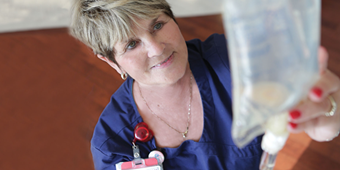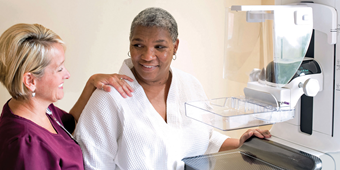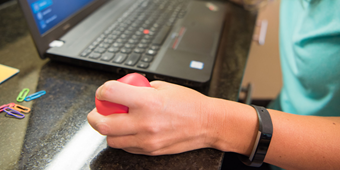Colorectal Cancer: Will It Happen to Me?

Answer a few questions and we'll provide you with a list of primary care providers that best fit your needs.
Colorectal cancer is the second-most common cancer in the U.S. So what’s the likelihood that you or a loved one might be at risk?
“Most colorectal cancer is what we call sporadic,” says Matthew P. Doepker, MD with Premier Surgical Oncology. In about 95 percent of cases it just shows up, and the cause is not known.
But there are certain things that increase your risk of colorectal cancer. Your age is one of them. The Centers for Disease Control report that more than 90 percent of colorectal cancer cases occur in people over the age of 50. Once you turn 45, the American Cancer Society recommends you undergo a colorectal cancer screening.
While you can’t turn back time, you might be able to have an impact on one of these other risk factors:
- Weight. People who are overweight or obese, especially men, face a higher risk of dying from colorectal cancer.
- Lack of physical activity. Get moving. It may lower your risk.
- Diet. Eating a lot of red meats (like beef, pork, lamb or liver) and processed meats (such as hot dogs and some luncheon meats) can raise your risk. On the flip side, diets high in vegetables, fruits and whole grains have been linked to a lower risk. (Fiber supplements, however, have not been shown to help.)
- Smoking. People who have been smoking a long time are more likely to develop, and die from, colorectal cancer, than non-smokers.
- Alcohol. Colorectal cancer has been linked to heavy alcohol use. The American Cancer Society (ACS) recommends limiting alcohol to no more than two drinks a day for men and one drink a day for women.
Unfortunately, like age, there are a few risk factors you can’t control, including:
- A personal history of colorectal polyps or colorectal cancer. The risk is especially high if the polyps were large or numerous.
- A personal history of inflammatory bowel disease (IBD), including either ulcerative colitis or Crohn’s disease. If you have IBD, you may need to be screened for colorectal cancer when you are younger than 45, and be screened more frequently than is usually recommended. (IBD is different from irritable bowel syndrome, or IBS, which does not increase your risk.)
- A family history of colorectal cancer or adenomatous polyps (a type of polyp that can become cancerous). If you have a first-degree relative (parent, sibling, or child) who has had colorectal cancer, you should talk to your doctor or health care provider about being screened before the age of 45.
- Inherited syndromes: About five to 10 percent of people who develop colorectal cancer have gene defects that can lead to them getting the disease, according to the ACS.
- Your racial and ethnic background: African Americans and Ashkenazi Jews (Jews of Eastern European descent) are especially at risk.
- Type 2 diabetes: Both type 2 diabetes and colorectal cancer share some risk factors, like weight. But even after taking those into account, people with type 2 diabetes still have an increased risk and a less favorable outlook after diagnosis.
Still curious about your risk? Talk to your physician so the appropriate screenings can be scheduled.
Answer a few questions and we'll provide you with a list of primary care providers that best fit your needs.
Sources: Centers for Disease Control and Prevention; National Cancer Institute; American Cancer Society; American Society of Clinical Oncology; Matthew P. Doepker, MD, Premier Surgical Oncology





